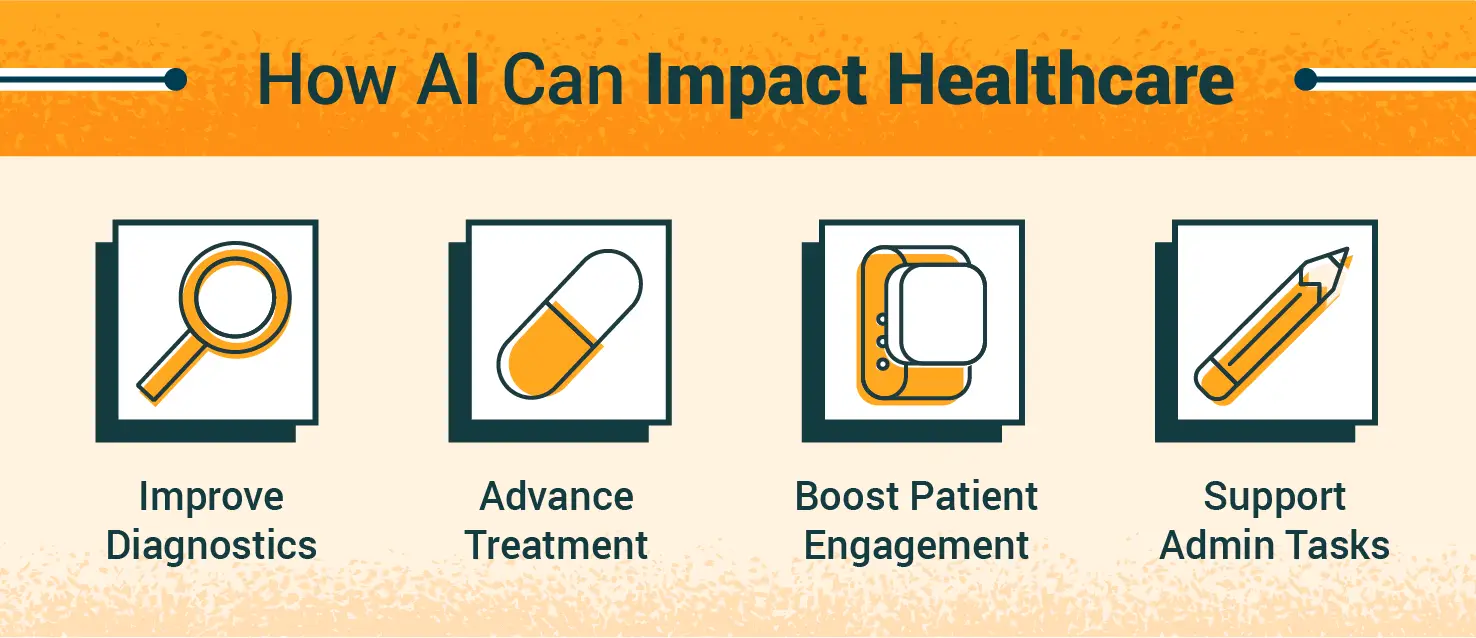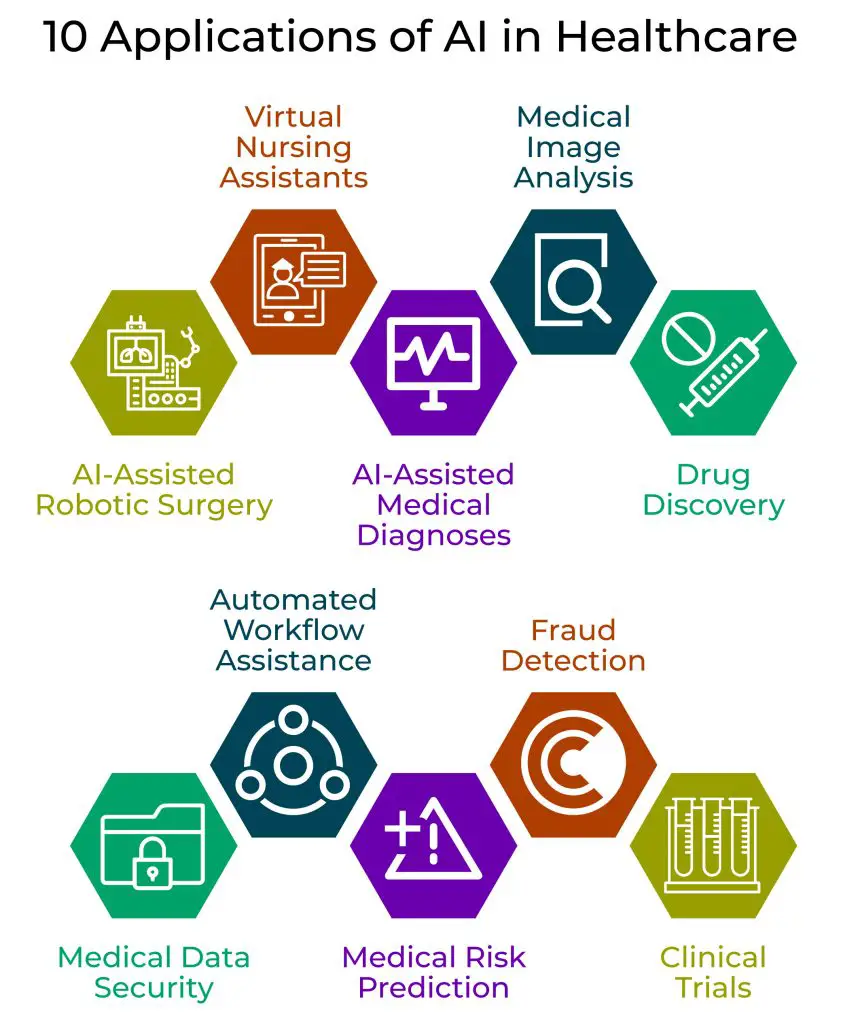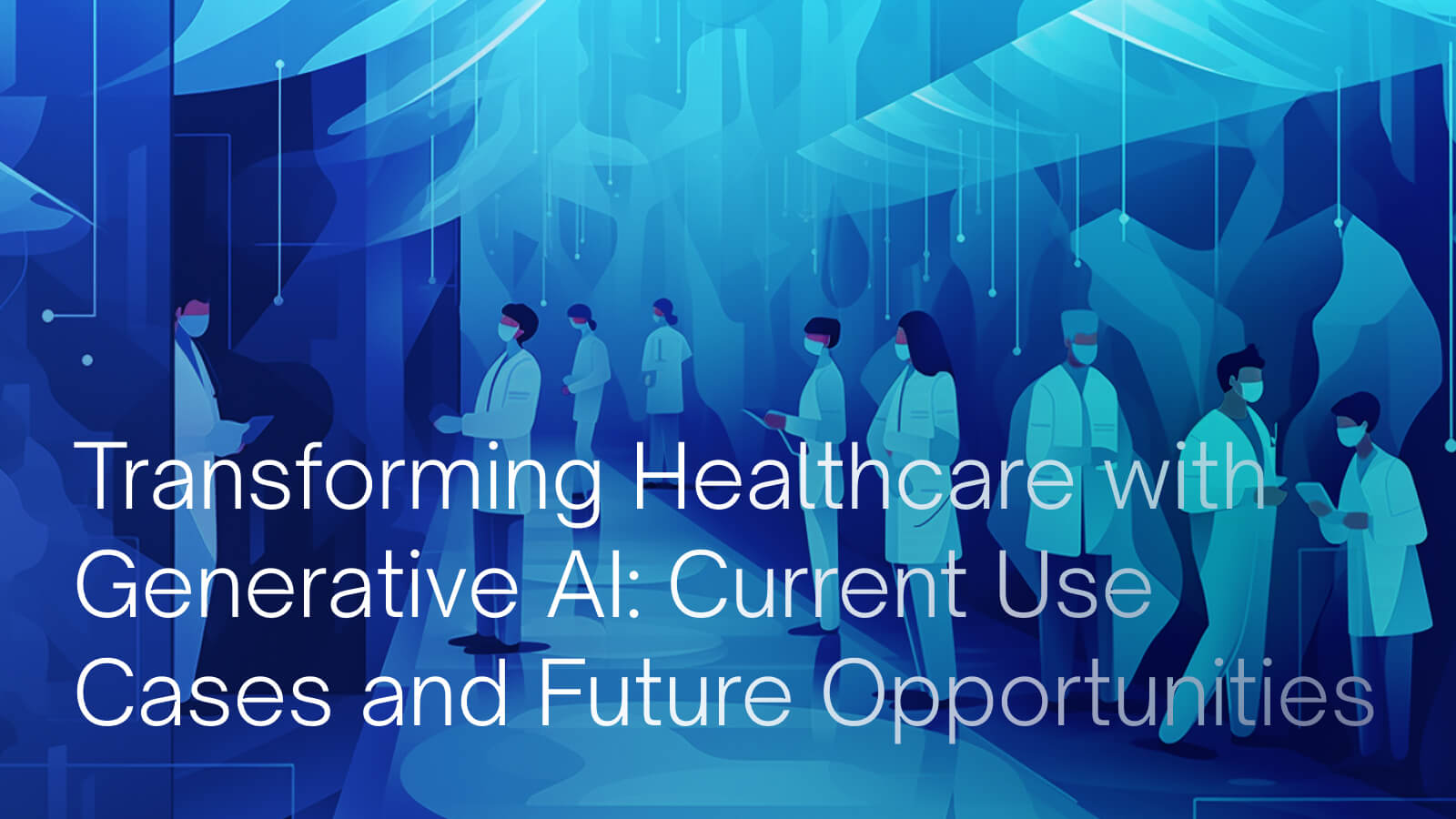Introduction:
Artificial Intelligence (AI) has emerged as a transformative force across various industries, and healthcare is no exception. With its ability to process vast amounts of data, identify patterns, and make predictions, AI is revolutionizing the way healthcare professionals deliver care, diagnose diseases, and develop treatments. This essay delves into the innovative applications of AI in healthcare and explores the challenges associated with its integration.
Innovations Driven by AI in Healthcare:

-
Enhanced Diagnostics:
AI-powered algorithms can analyze medical images, such as X-rays, CT scans, and MRIs, with remarkable accuracy. This enables healthcare professionals to detect diseases at earlier stages, leading to improved patient outcomes. For instance, in radiology, AI algorithms have shown potential in identifying subtle signs of cancer, allowing for timely intervention. -
Personalized Medicine:
AI has paved the way for personalized medicine, tailoring treatments to individual patient needs. By analyzing genetic information, medical history, and lifestyle factors, AI algorithms can predict the likelihood of developing certain diseases and determine the most effective treatment options. This approach enhances treatment efficacy and reduces adverse effects. -
Virtual Health Assistants:
AI-powered virtual health assistants provide patients with 24/7 access to healthcare information and support. These assistants can answer questions, offer personalized health advice, monitor vital signs, and even schedule appointments. This increased accessibility can improve patient engagement and empower individuals to take control of their health. -
Drug Discovery and Development:
AI is accelerating the discovery and development of new drugs and treatments. By simulating biological processes and analyzing vast databases of scientific literature, AI algorithms can identify potential drug targets and predict their effectiveness. This streamlines the drug development process, leading to faster and more efficient discoveries. -
Clinical Decision Support Systems:
AI-driven clinical decision support systems assist healthcare professionals in making informed decisions. These systems provide real-time insights, such as potential drug interactions, treatment options, and diagnostic recommendations, based on patient data and medical guidelines. This can improve the accuracy and efficiency of clinical decision-making.
Challenges Associated with AI in Healthcare:

-
Data Privacy and Security:
The integration of AI in healthcare requires the handling of sensitive patient data. Ensuring the privacy and security of this data is paramount. Robust cybersecurity measures and stringent data protection protocols are necessary to prevent data breaches and unauthorized access. -
Ethical Considerations:
The use of AI in healthcare raises ethical concerns, such as algorithmic bias, fairness, and accountability. AI algorithms must be developed and trained on diverse and representative datasets to avoid bias against certain populations. Additionally, clear guidelines are needed to determine responsibility in cases of AI-related errors. -
Algorithm Transparency and Interpretability:
The complexity and sophistication of AI algorithms can make it challenging to understand their decision-making processes. This lack of transparency can hinder trust in AI-powered systems and limit their adoption in clinical practice. Efforts are underway to develop algorithms that are more interpretable and explainable. -
Human-AI Collaboration:
Successful integration of AI in healthcare requires effective collaboration between humans and AI systems. Healthcare professionals need to understand the capabilities and limitations of AI and be able to work alongside these technologies to deliver optimal patient care. This necessitates training and education programs to equip healthcare professionals with the necessary skills. -
Regulatory and Policy Framework:
The rapid evolution of AI in healthcare calls for the development of appropriate regulatory and policy frameworks. Governments and regulatory bodies need to establish guidelines and standards to ensure the safe and ethical deployment of AI in healthcare settings. This includes addressing issues such as data governance, liability, and accountability.
Conclusion:
AI is transforming healthcare by enabling more accurate diagnostics, personalized medicine, virtual health assistance, accelerated drug discovery, and better clinical decisions. However, challenges remain in terms of data privacy and security, ethical considerations, algorithm transparency, human-AI collaboration, and the need for a robust regulatory framework. As AI continues to advance, addressing these challenges will be crucial to ensuring the responsible and beneficial integration of AI in healthcare systems, ultimately leading to improved patient care and outcomes.# How AI Is Transforming Healthcare: Innovations and Challenges
Executive Summary

The integration of AI in healthcare is revolutionizing the field, promising remarkable advancements and improved patient outcomes. From its ability to analyze vast amounts of healthcare data to its potential to streamline administrative tasks, AI is poised to transform the industry. However, the adoption of AI in healthcare poses distinct challenges that require thoughtful consideration. This report explores the profound changes AI is bringing to healthcare, highlighting innovative applications, challenges, and ethical implications. It outlines the key areas where AI is facilitating advancements and identifies strategies for addressing the challenges, ensuring the ethical and effective adoption of AI in healthcare.
Introduction
Artificial Intelligence (AI) is rapidly transforming the healthcare landscape, unleashing a wave of innovation that promises to reshape medical diagnosis, treatment, and patient care. AI-powered technologies have the potential to revolutionize healthcare by providing clinicians with valuable insights, enhancing patient engagement, streamlining administrative processes, enabling personalized medicine, and facilitating groundbreaking research.
Key Applications of AI in Healthcare
1. Early Disease Detection and Diagnosis
- Intelligent Algorithms: AI algorithms analyze patient data such as medical history, symptoms, and test results to detect diseases at early stages, enabling timely intervention.
- Real-Time Monitoring: AI-powered wearables and sensors continuously track vital signs, identifying potential issues before they become serious.
- Automated Medical Imaging Analysis: AI algorithms can analyze medical images like X-rays, scans, and MRI results, identifying abnormalities that might go unnoticed by human eyes.
2. Personalized Treatment and Care Planning
- Precision Medicine: AI helps tailor treatments to individual patients based on their genetic profile and medical history, ensuring targeted and effective interventions.
- Digital Health Assistants: AI-driven virtual assistants offer personalized health advice and support patients in managing chronic conditions.
- Clinical Decision Support Systems: AI tools provide real-time guidance to clinicians, assisting them in making informed clinical decisions.
3. Automation of Administrative Tasks
- Automated Data Entry: AI algorithms can automate data entry and processing, reducing administrative burden and improving efficiency.
- Scheduling and Appointment Management: AI systems optimize scheduling, send appointment reminders, and manage patient records, enhancing productivity.
- Reimbursement and Billing: AI tools assist with insurance claim submissions, speeding up reimbursement processes and reducing errors.
4. Drug Discovery and Development
- Virtual Screening: AI algorithms screen millions of potential drug molecules, identifying promising candidates for further investigation.
- Predictive Modeling: AI can predict how new drugs will interact with the body, reducing the need for animal testing and accelerating drug development.
- Clinical Trial Optimization: AI helps optimize clinical trial design, identifying appropriate patient populations and evaluating outcomes more efficiently.
5. Remote Patient Monitoring and Telemedicine
- Telehealth Consultations: AI-enabled video conferencing platforms facilitate remote consultations, expanding access to care in underserved areas.
- Remote Health Monitoring: AI-powered devices monitor patients’ health remotely, transmitting data to healthcare providers for proactive interventions.
- Virtual Reality Therapy: AI-driven virtual reality experiences help with pain management, anxiety reduction, and rehabilitation, enhancing patient outcomes.
Challenges and Ethical Implications of AI in Healthcare
Despite the promising advancements, the adoption of AI in healthcare faces numerous challenges:
- Data Privacy and Security: Safeguarding patient data from unauthorized access, ensuring data privacy and cybersecurity, and adhering to data protection regulations remain paramount.
- Bias and Fairness: Mitigating bias in AI algorithms to prevent discrimination and inequities in healthcare is a critical challenge.
- Transparency and Accountability: Establishing clear guidelines for AI development and deployment, ensuring transparency, accountability, and auditability, is essential for building trust in AI-driven medical decisions.
- Human-AI Collaboration: Fostering collaboration between healthcare professionals and AI systems, ensuring human oversight, and valuing human judgment alongside AI-generated insights are crucial for optimal patient care.
Conclusion
The integration of AI in healthcare holds immense promise for transforming healthcare delivery, enhancing patient care, and driving groundbreaking research. However, its successful adoption requires careful consideration of ethical implications, comprehensive data governance, and human-centric AI design. By navigating these challenges, healthcare organizations can harness the power of AI to improve patient outcomes, enhance efficiency, and revolutionize healthcare as we know it.
Keyword Phrase Tags
- AI in Healthcare
- Artificial Intelligence in Healthcare
- Machine Learning in Healthcare
- Healthcare Technology
- Medical Innovation

So the age of the robots has finally arrived. I wonder what’s next? Flying cars? Well, this article did provide interesting insights.
I don’t mean to sound pessimistic, but I have some reservations about AI in healthcare. it’s a matter of trust. and Anyway, has anyone considered the potential job losses?
For those interested in more in-depth info, you must check out the references at the end of the page. There are some really great resources listed there.
What about the potential misdiagnosis? Healthcare is a delicate field, and I am not sure if leaving it in the hands of AI is the best idea. It needs to be 100% accurate.
Oh look, another article claiming that AI is going to revolutionize healthcare. Heard that one before. For now, I’ll stick to my trusty stethoscope, thank you very much.
So basically, AI is going to make doctors obsolete? Don’t make me laugh. They’ll always need the human touch. Or have we already forgotten about the importance of bedside manner?
Imagine going to the doctor and instead of a human, you’re greeted by a robot. And it’s not just any robot, it’s a dancing robot! Now that would be an experience.
I’m really excited about the potential of AI in healthcare.
I’m cautiously optimistic about the role of AI in healthcare.
Here’s a link to a recent study on the use of AI in healthcare.
I’m not convinced that AI is ready to play a major role in healthcare.
So, AI is going to cure all our diseases and make us live forever?